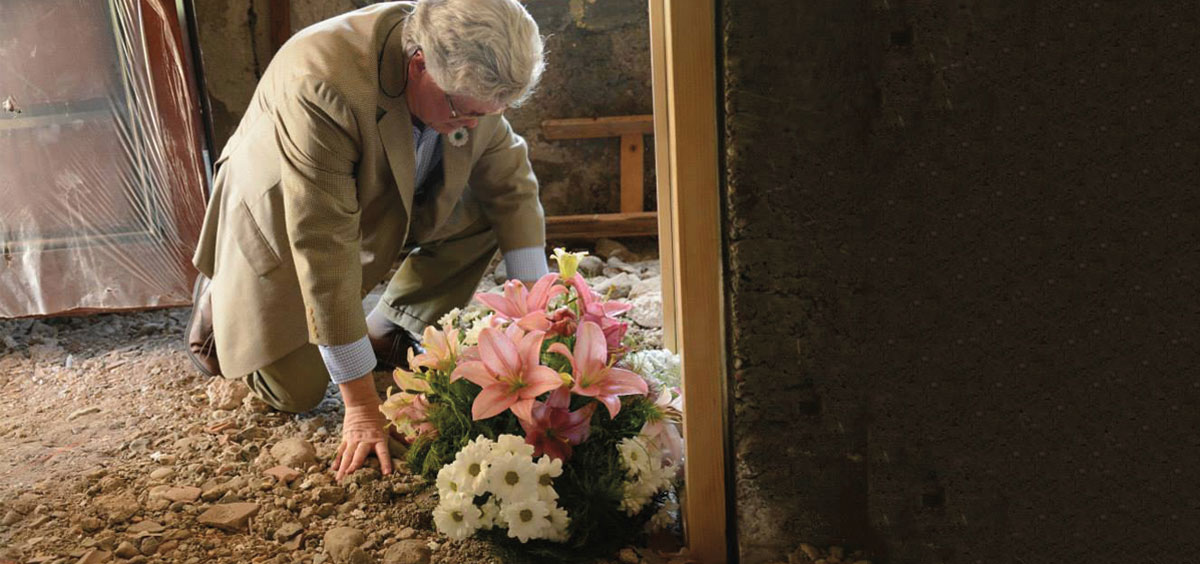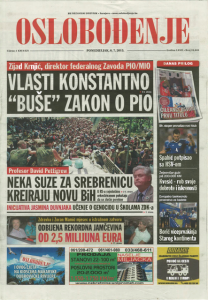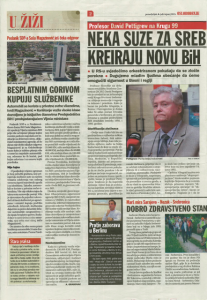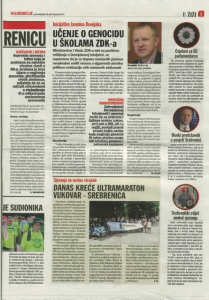Through his writings, lectures and interviews with the media, Professor of Philosophy David Pettigrew has been a powerful voice for the victims of atrocities in Bosnia-Herzegovina. On Nov. 29, he delivered a lecture in the Bosnian capital, Sarajevo, on the legacy of the Dayton Peace Accords, which ended the ethnic conflict in the fledgling nation 20 years ago.
Bosnia and Herzegovina declared independence from Yugoslavia on March 1, 1992, triggering a secessionist bid by the country’s Serbs backed by the Yugoslavian capital, Belgrade, and a war that left about 100,000 dead, including the mass slaughter of many Bosnian Muslims by Serb forces.
Following earlier lectures in Prague and Stockholm that identified human rights violations in Republika Srpska, (the Bosnian Serb Republic), Pettigrew’s Nov. 29 speech condemned efforts in the republic to deny the genocide and to demean and otherwise psychologically intimidate Bosnian Muslims who were targeted and driven from Višegrad, in the eastern part of the country, as well as from other towns and villages across Republika Srpska.
Join Dr. Pettigrew for a film screening and discussion: Friday, Dec. 4 from 1-3 p.m.
Pettigrew wrote that the political culture in Republika Srpska “is breeding hatred and contempt of the Bosnian Muslims”:
“The culture of genocide denial and dehumanization, produces what I call in my paper a ‘cumulative cruelty’ directed at genocide survivors,” he said. “The cumulative cruelty directed against Bosnia’s Muslims and non-Serbs is the sad legacy of Dayton. The lecture calls for constitutional reform to reunify the country with national laws against hate speech and genocide denial…”
This summer, Pettigrew led a delegation to the town of Višegrad in eastern Bosnia to meet with activist Bakira Hasečić and show public solidarity with her in defense of the Pionirska Street house, where 59 women and children were burned alive. Hasečić , who was a rape victim in Višegrad, has been prosecuted and fined for trying to rebuild the house in order to save it from destruction by the municipality.
Pettigrew became particularly interested in Višegrad because of the nature of the atrocities there and because the town continues to maintain a culture of denial. Regarding the crimes in the town, the International Criminal Tribunal for the former Yugoslavia wrote in its Judgement that:
“In the all too long, sad and wretched history of man’s inhumanity to man, the Pionirska street [June 14, 1992] and Bikavac fires [June 27, 1992] must rank high…. By burning the victims and the houses in which they were trapped, Milan Lukić and the other perpetrators intended to obliterate the identities of their victims and, in so doing, to strip them of their humanity. The families of victims could not identify or bury their loved ones. … There is a unique cruelty in expunging all traces of the individual victims which must heighten the gravity ascribed to these crime.”
Today, only the Pionirska Street house remains, rebuilt by Hasečić and other local activists to prevent its destruction and preserve the memory of these crimes. The house is still threatened by an “expropriation” process by the city so the only memorial to the victims could still be destroyed, said Pettigrew, who joined the members of his delegation in laying flowers in the house in memory of the victims.
“When I put the flowers in the basement at the base of a display with the photos of the victims, everyone was in tears and speechless,” he said. “Without planning it, we formed a line-up for a photo in front of the basement where the crime took place: in memory of the victims, in solidarity with Bakira, and in defiance of genocide denial.”
The delegation who attended with Pettigrew (photographed below outside the Pionirska Street house) included: Ermin Kuka and Ilvana Salić, from The Institute for Research of Crimes against Humanity and International Law at the University of Sarajevo; Professor Benjamin Moore, from Fontbonne University in St. Louis; Marketá Slavková from Charles University Prague, and Jasmin Tabaković, a refugee who fled from Višegrad with his family when he was four years old. He lives now in Belgium, and this was the first time that he had returned since his family was expelled.
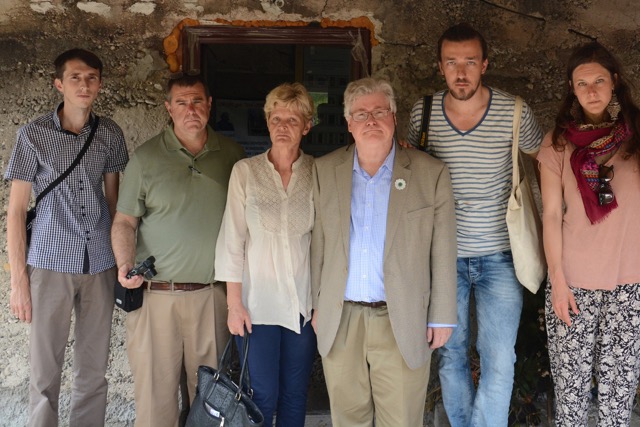
Hasečić, president of the Association “Women Victims of War”-Sarajevo, Bosnia and Herzegovina, wrote of Pettigrew: “At a time when the victims of the genocide and aggression against the Republic of Bosnia and Herzegovina have been abandoned, when we have been left vulnerable and exposed, while war criminals enjoy rights and protections, when we have again been forgotten by the international community, and when many historians around the world who serve the interests of the ideologues and lobbyists of greater Serbia seek to re-write history and wash the blood from the hands of the war criminals, there are a few intellectual and moral giants who dedicate their lives and research to telling humanity the truth about what happened in Bosnia and Herzegovina from 1992-1995. Among these few is the distinguished Professor Dr. David Pettigrew.”
Pettigrew initially became involved in Višegrad in summer 2010 when he accompanied a government exhumation team there. Repairs on a nearby dam had caused the river level to drop, so the experts hoped they would be able to find the remains of the 3,000 victims who were murdered on the bridge and thrown into the river.
Pettigrew was assigned to a team that located loose bones on the river banks as well as full skeletons just beneath the riverbed. When about 60 of the victims had been identified, they were buried in the Muslim cemetery in Višegrad with a memorial inscribed to: “the memory of the victims of the Višegrad genocide.”
Local authorities began to plan to destroy the memorial and ground the word “genocide” from the inscription. In that and subsequent years, Pettigrew has written letters to United Nations and international government leaders, seeking to protect this memorial and the Pionirska Street house, as well delivering lectures and conducting media interviews to raise awareness about the genocide that occurred in the region and its lingering legacy. In October 2014, for example, he delivered a keynote address at Charles University in Prague, Czech Republic, on “The Suppression of Collective Memory and Identity in Bosnia: Prohibited Memorials and the Continuation of Genocide.”
The Institute for Research of Genocide Canada recently thanked Pettigrew for his “continuous struggle for the truth about the aggression against the Republic of Bosnia and Herzegovina and genocide against its citizens.”
“Professor David Pettigrew is an example of an intellectual who put his knowledge at the service of truth and justice. It is a major contribution to peace in the world.”
Pettigrew’s Nov. 29 lecture and related press conference generated considerable media coverage in online portals, on television and in print:
On-line coverage
http://www.vecernji.ba/visoki-predstavnik-treba-postaviti-bih-na-put-ustavnih-reformi-1040948
http://novovrijeme.ba/pettigrew-visoki-predstavnik-treba-postaviti-bih-na-put-ustavnih-reformi/
TV News
http://www.federalna.ba/bhs/vijest/148748/video-na-krugu-99-o-bonskim-ovlastima

